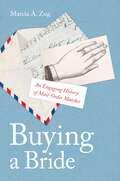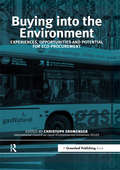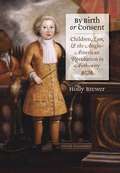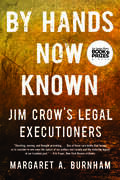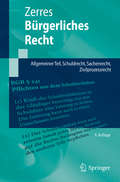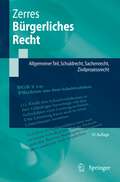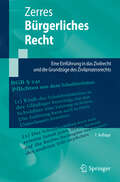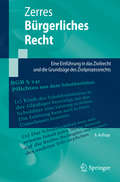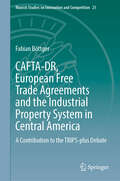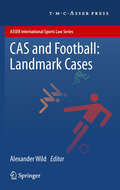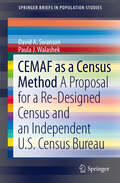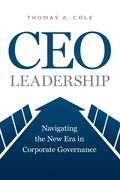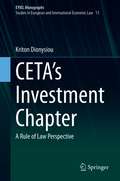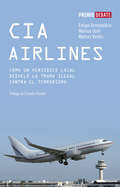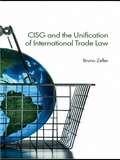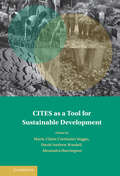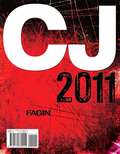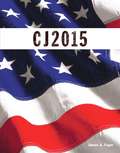- Table View
- List View
Buying Your Home: A Practical Guide for First-Time Buyers
by Lien Bich Luu Ai-Quang TonthatMany young people aspire to own their own home but face a myriad of challenges such as high property prices, the need to raise a large deposit, and difficulties of getting a mortgage. The process of buying a property is also stressful, fraught with complexity and uncertainty, and a mistake can prove very costly. This book therefore provides a much-needed step-by-step guide to help those seeking to buy a property for the first time. Packed with helpful and practical tips, this book gives a complete overview of the house-buying process, including finance, legal and property aspects. The authors discuss a wide range of topics, including: creating the right mindset the pros and cons of home ownership how to choose a suitable property how to save for a deposit how to negotiate for a better price how to get a mortgage the steps in the house-buying process how to ensure that mortgage payments can always be met The book is written by experienced property buyers who have bought multiple properties, who have worked as a mortgage adviser and financial planner and who understand personal finance. It will be essential reading for undergraduate students in the field of accounting and finance and will also appeal to the general public, particularly those seeking to buy a property for the first time. After reading the book, readers will be able to map out a plan to buy their first property with greater confidence and make a better and more informed decision that will bring financial rewards.
Buying a Bride: An Engaging History of Mail-Order Matches
by Marcia A. ZugThere have always been mail-order brides in America—but we haven’t always thought about them in the same ways. In Buying a Bride, Marcia A. Zug starts with the so-called “Tobacco Wives” of the Jamestown colony and moves all the way forward to today’s modern same-sex mail-order grooms to explore the advantages and disadvantages of mail-order marriage. It’s a history of deception, physical abuse, and failed unions. It’s also the story of how mail-order marriage can offer women surprising and empowering opportunities.Drawing on a forgotten trove of colorful mail-order marriage court cases, Zug explores the many troubling legal issues that arise in mail-order marriage: domestic abuse and murder, breach of contract, fraud (especially relating to immigration), and human trafficking and prostitution. She tells the story of how mail-order marriage lost the benign reputation it enjoyed in the Civil War era to become more and more reviled over time, and she argues compellingly that it does not entirely deserve its current reputation. While it is a common misperception that women turn to mail-order marriage as a desperate last resort, most mail-order brides are enticed rather than coerced. Since the first mail-order brides arrived on American shores in 1619, mail-order marriage has enabled women to improve both their marital prospects and their legal, political, and social freedoms. Buying A Bride uncovers this history and shows us how mail-order marriage empowers women and should be protected and even encouraged.
Buying into the Environment: Experiences, Opportunities and Potential for Eco-procurement
by Christoph ErdmengerGreen purchasing - or eco-procurement - by local and central governments has long been recommended in documents such as Agenda 21 to be a key - although sometimes supplemental-ingredient in the achievement of more environmentally responsible economies. Certainly, sustainable consumption cannot be considered a realistic goal without the full engagement of public authorities. Many initiatives have been undertaken in OECD countries, most successfully in Japan and Denmark where green public purchasing has been proven to be workable and highly effective, while, in other countries, city municipalities have successfully pioneered the development of sophisticated public environmental purchasing policies. However, for the vast majority of countries and their major cities, the potential for green public purchasing remains woefully untapped. A key question is what would be the environmental impact if the majority of cities in Europe replicated the success stories of those leading the way? Public procurement has, after all, been an important tool in achieving other public policy goals such as defence. Why should it not be used as a tool to defend the environment?The RELIEF project, funded by the EU's "City of Tomorrow and Cultural Heritage" programme was established to answer exactly this question: to define the true potential of eco-procurement and to develop a strategy for change in Europe. Buying into the Environment is the result of the research segment of the project which has now been completed. A further stage-to design a Europe-wide action plan will follow in 2004.The book, organised under the auspices of the International Council on Local Environmental Initiatives (ICLEI) analyses national approaches already tested, and provides in-depth surveys on the pioneer cities such as Hamburg, Malmo and Zurich. Serious attention is given to city-specific hurdles which have been faced and overcome. The most relevant product groups for eco-procurement such as construction, transport, energy, information technology, furniture and food. are also analysed.Uniquely, the book also provides calculations on the environmental benefits potentially achievable through greener purchasing. Tools were developed and tested by the RELIEF researchers on the environmental assessment of products, public buying power and on evaluations of market conditions in order to provide scenarios for the application of green purchasing at a European level. The conclusions are that there is huge potential for both local and central governments to adapt their behaviour patterns and purchase in a more environmentally responsible way. For example, 18% of the EU's Kyoto Protocol commitment could be achieved if major cities in the European Union purchased green electricity. The results are complemented by new ideas on how best to foster innovation in public contractual arrangements-to encourage the development of products such as super-energy-efficient computers and fuel cells-and how the legal system may require adaptation and reform.The results presented in this book will provide an indispensable resource for municipalities, governments, researchers and business practitioners looking for answers on how public procurement can have a fundamental and manifestly positive effect on the environment.
By Birth or Consent
by Holly BrewerIn mid-sixteenth-century England, people were born into authority and responsibility based on their social status. Thus elite children could designate property or serve in Parliament, while children of the poorer sort might be forced to sign labor contracts or be hanged for arson or picking pockets. By the late eighteenth century, however, English and American law began to emphasize contractual relations based on informed consent rather than on birth status. In By Birth or Consent, Holly Brewer explores how the changing legal status of children illuminates the struggle over consent and status in England and America. As it emerged through religious, political, and legal debates, the concept of meaningful consent challenged the older order of birthright and became central to the development of democratic political theory. The struggle over meaningful consent had tremendous political and social consequences, affecting the whole order of society. It granted new powers to fathers and guardians at the same time that it challenged those of masters and kings. Brewer's analysis reshapes the debate about the origins of modern political ideology and makes connections between Reformation religious debates, Enlightenment philosophy, and democratic political theory. In mid-sixteenth-century England, people were born into authority and responsibility based on their social status. By the late eighteenth century, however, English and American law began to emphasize contractual relations based on informed consent rather than on birth status. In By Birth or Consent, Holly Brewer explores how the changing legal status of children illuminates the debates over consent and status in England and America. The struggle over meaningful consent had tremendous political and social consequences, affecting the whole order of society. As it emerged through religious, political, and legal debates, the concept of meaningful consent challenged the older order of birthright and became central to the development of democratic political theory. -->
By Hands Now Known: Jim Crow's Legal Executioners
by Margaret A. BurnhamA Finalist for the 2022 Kirkus Prize for Nonfiction One of NPR's Books We Love in 2022 • Named a Best Book of the Year: The New Yorker, Oprah Daily, Kirkus, Chicago Public Library, and Publishers Weekly A paradigm-shifting investigation of Jim Crow–era violence, the legal apparatus that sustained it, and its enduring legacy, from a renowned legal scholar. If the law cannot protect a person from a lynching, then isn’t lynching the law? In By Hands Now Known, Margaret A. Burnham, director of Northeastern University’s Civil Rights and Restorative Justice Project, challenges our understanding of the Jim Crow era by exploring the relationship between formal law and background legal norms in a series of harrowing cases from 1920 to 1960. From rendition, the legal process by which states make claims to other states for the return of their citizens, to battles over state and federal jurisdiction and the outsize role of local sheriffs in enforcing racial hierarchy, Burnham maps the criminal legal system in the mid-twentieth-century South, and traces the unremitting line from slavery to the legal structures of this period and through to today. Drawing on an extensive database, collected over more than a decade and exceeding 1,000 cases of racial violence, she reveals the true legal system of Jim Crow, and captures the memories of those whose stories have not yet been heard.
By Way of Sorrow (An Erin McCabe Legal Thriller #1)
by Robyn Gigl&“Emotionally resonant…Gigl is too astute and compassionate a writer to create cartoon villainy out of anti-trans attitudes…quietly groundbreaking.&” —The New York Times Book ReviewIn a fresh and riveting thriller debut, Robyn Gigl introduces Erin McCabe, a New Jersey criminal defense attorney doing her best to live a quiet life in the wake of profound personal change—until a newsworthy case puts both her career and safety in jeopardy . . . Erin McCabe has been referred the biggest case of her career. Four months ago, William E. Townsend, Jr., son of a New Jersey State Senator, was found fatally stabbed in a rundown motel near Atlantic City. Sharise Barnes, a nineteen-year-old transgender prostitute, is in custody, and given the evidence against her, there seems little doubt of a guilty verdict. Erin knows that defending Sharise will blow her own private life wide open, and doubtless deepen her estrangement from her family. Yet as a trans woman, she feels uniquely qualified to help Sharise, and duty-bound to protect her from the possibility of a death sentence. Sharise claims she killed the senator&’s son in self-defense. As Erin assembles the case with her partner, former FBI agent Duane Swisher, the circumstances hint at a more complex and chilling story with ties to other brutal murders. Senator Townsend is using the full force of his prestige and connections to publicly discredit everyone involved in defending Sharise. Behind the scenes, his tactics are even more dangerous. His son had secrets that could destroy the senator&’s political aspirations—secrets worth killing for. And as leads begin mysteriously disappearing, it&’s not just the life of Erin&’s client at stake, but her own . . .
Byzantine Legal Culture and the Roman Legal Tradition, 867–1056
by Zachary ChitwoodThis social history of Byzantine law offers an introduction to one of the world's richest yet hitherto understudied legal traditions. In the first study of its kind, Chitwood explores and reinterprets the seminal legal-historical events of the Byzantine Empire under the Macedonian dynasty, including the re-appropriation and refashioning of the Justinianic legal corpus and the founding of a law school in Constantinople. During this last phase of Byzantine secular law, momentous changes in law and legal culture were underway: the patronage of the elite was reflected in the legal system, theological terms from Orthodox Christianity entered the vocabulary of Byzantine jurisprudence, and private legal collections of uncertain origins began to circulate in manuscripts alongside official redactions of Justinianic law. By using the heuristic device of exploring legal culture, this book examines the interplay in law between the Roman political heritage, Orthodox Christianity and Hellenic culture.
Bürgerbeteiligung an der Verwaltung am Beispiel der Hamburgischen Deputationen: Veraltete Beteiligungsform oder bewährtes Mitwirkungsinstrument
by Stephan MeynDieses Buch beleuchtet das althergebrachte Verwaltungsgremium der Hamburgischen Deputationen im verwaltungswissenschaftlichen, historischen, rechts- sowie politikwissenschaftlichen Kontext. Als zentrale Frage wird untersucht, ob die Deputationen in ihrer bis zum Ende der 21. Legislaturperiode bestehenden Form ihre Daseinsberechtigung hatten, welchen historischen Ursprungs sie waren, welchen Reformbedarf es gab und ob sie der Verfassungsvorgabe in Artikel 56 der Hamburgischen Verfassung (a. F.), das Volk an der Verwaltung mitwirken zu lassen, entsprachen. Hierzu wird einerseits eine umfassende quantitative Erhebung mit Hilfe eines standardisierten Fragebogens unter den Deputierten durchgeführt und durch eine qualitative Erhebung in Form von Leitfadeninterviews ergänzt. Andererseits werden die historischen Wurzeln seit dem späten Mittelalter und die Entwicklungen bis zur Gegenwart herausgearbeitet sowie die Rechtslage vor dem Hintergrund der Verfassungsgeschichte und -wirklichkeit auch im Vergleich zu anderen deutschen Ländern dargestellt.
Bürgerbeteiligung und Verwaltungspraxis: Langzeitevaluationen der Auswirkungen von Beteiligungsregelungen in Baden-Württemberg (Politik gestalten - Kommunikation, Deliberation und Partizipation bei politisch relevanten Projekten)
by Silke I. Keil Jan Ziekow Ingo Hamann Friederike Bickmann Lucia Scharpf Katharina BührenDieses Buch thematisiert die Beteiligung von Bürger*innen bei Planungs- und anderen umweltrelevanten Vorhaben in Baden-Württemberg. Im Rahmen der Intensivierung der Beteiligung von Bürger*innen wurde ab 2014 in Baden-Württemberg mithilfe der Regelungen der Verwaltungsvorschrift Öffentlichkeitsbeteiligung, des zugehörigen Leitfadens für eine neue Planungskultur sowie des Umweltverwaltungsgesetzes eine neue, bundesweit bis dahin einmalige Beteiligungskultur gestartet. Der Band überprüft und bewertet anhand einer langfristigen begleitenden Evaluation die Erreichung der intendierten Ziele der Beteiligungsregelungen sowie die für die Verwaltungen entstehenden Aufwände.
Bürgerliches Recht: Allgemeiner Teil, Schuldrecht, Sachenrecht, Zivilprozessrecht (Springer-Lehrbuch)
by Thomas ZerresDie neunte Auflage deckt die wesentlichen Inhalte des zivilrechtlichen Lehrstoffes ab. Es werden in kompakter Form der Allgemeine Teil des BGB, das (Allgemeine und Besondere) Schuldrecht sowie das Sachenrecht dargestellt. Vervollständigt wird dieses Buch mit einem abschließenden Kapitel zum Zivilprozessrecht. Geschult werden das Verständnis für die Strukturen und Zusammenhänge im Bürgerlichen Recht und das Verständnis für die Verbindungen mit dem Zivilprozessrecht. Eine Vielzahl von Beispielen aus der Praxis, einprägsame Illustrationen, zahlreiche Schemata und Fälle mit Lösungsvorschlägen ermöglichen damit gleichzeitig auch ein anwendungsorientiertes bzw. fallorientiertes Lernen. Seine inhaltliche Kompaktheit macht es so zu einem idealen studienbegleitenden Lehrbuch für Studierende an Universitäten, Hochschulen, Berufsakademien und anderen Bildungseinrichtungen.
Bürgerliches Recht: Allgemeiner Teil, Schuldrecht, Sachenrecht, Zivilprozessrecht (Springer-Lehrbuch)
by Thomas ZerresDie nun vorliegende vollständig überarbeitete und aktualisierte zehnte Auflage des bewährten Lehrbuches deckt die wesentlichen Inhalte des zivilrechtlichen Lehrstoffes ab. Es werden in kompakter Form der Allgemeine Teil des BGB, das (Allgemeine und Besondere) Schuldrecht sowie das Sachenrecht dargestellt. Vervollständigt wird dieses Buch mit einem abschließenden Kapitel zum Zivilprozessrecht. Geschult werden das Verständnis für die Strukturen und Zusammenhänge im Bürgerlichen Recht und das Verständnis für die Verbindungen mit dem Zivilprozessrecht. Eine Vielzahl von Beispielen aus der Praxis, einprägsame Illustrationen, zahlreiche Schemata und Fälle mit Lösungsvorschlägen ermöglichen damit gleichzeitig auch ein anwendungsorientiertes bzw. fallorientiertes Lernen. Seine inhaltliche Kompaktheit macht es so zu einem idealen studienbegleitenden Lehrbuch für Studierende an Universitäten, Hochschulen, Berufsakademien und anderen Bildungseinrichtungen.
Bürgerliches Recht: Eine Einführung in das Zivilrecht und die Grundzüge des Zivilprozessrechts (Springer-Lehrbuch)
by Thomas ZerresDas kompakte Lehrbuch eignet sich für Studierende an Universitäten, Fachhochschulen und anderen Bildungseinrichtungen sowohl als Einstieg in das Bürgerliche Recht als auch im weiteren Verlauf des Studiums zur Wiederholung. Eine Vielzahl von Beispielen aus der Praxis und einprägsame Illustrationen machen in eingängiger Erläuterung vertraut mit den ersten drei Büchern des Bürgerlichen Gesetzbuches sowie den Grundzügen der Zivilprozessordnung. Geschult werden das Verständnis für die Strukturen und Zusammenhänge im Bürgerlichen Recht und das Verständnis für die Verbindungen mit dem Zivilprozessrecht.
Bürgerliches Recht: Eine Einführung in das Zivilrecht und die Grundzüge des Zivilprozessrechts (Springer-Lehrbuch)
by Thomas ZerresDas kompakte Lehrbuch eignet sich für Studierende an Universitäten, Fachhochschulen und anderen Bildungseinrichtungen sowohl als Einstieg in das Bürgerliche Recht als auch im weiteren Verlauf des Studiums zur Wiederholung. Eine Vielzahl von Beispielen aus der Praxis und einprägsame Illustrationen machen in eingängiger Erläuterung vertraut mit den ersten drei Büchern des Bürgerlichen Gesetzbuches sowie den Grundzügen der Zivilprozessordnung. Geschult werden das Verständnis für die Strukturen und Zusammenhänge im Bürgerlichen Recht und das Verständnis für die Verbindungen mit dem Zivilprozessrecht. Die vorliegende 8. Auflage wurde, unter Beibehaltung der bewährten Konzeption, vollständig überarbeitet und aktualisiert.
C.S. Lewis on Politics and the Natural Law
by Justin Buckley Dyer Micah J. WatsonConventional wisdom holds that C. S. Lewis was uninterested in politics and public affairs. The conventional wisdom is wrong. As Justin Buckley Dyer and Micah J. Watson show in this groundbreaking work, Lewis was deeply interested in the fundamental truths and falsehoods about human nature and how these conceptions manifest themselves in the contested and turbulent public square. Ranging from the depths of Lewis' philosophical treatments of epistemology and moral pedagogy to practical considerations of morals legislation and responsible citizenship, this book explores the contours of Lewis' multi-faceted Christian engagement with political philosophy generally and the natural-law tradition in particular. Drawing from the full range of Lewis' corpus and situating his thought in relationship to both ancient and modern seminal thinkers, C. S. Lewis on Politics and the Natural Law offers an unprecedented look at politics and political thought from the perspective of one of the twentieth century's most influential writers.
CAFTA-DR, European Free Trade Agreements and the Industrial Property System in Central America: A Contribution to the TRIPS-plus Debate (Munich Studies on Innovation and Competition #21)
by Fabian BöttgerThis book analyses the impact of CAFTA-DR and European Free Trade Agreements on the industrial property system in Central America. While there is ample literature on bilateral and regional FTAs, it is often limited to the contractual obligations assumed by the participating countries. This book goes a step further and analyses how these obligations are implemented through national legislation, institutional changes and legal practice. To provide a deeper understanding of the effects of FTAs on national IP systems, the book addresses research questions that go beyond general publications on the topic. Research questions include: Is the combination of market access and IP rules in a bilateral FTA an effective and appropriate trade deal? How are the IP requirements under the FTAs implemented into the national statutory framework? Do the IP rules of FTAs sufficiently address institutional factors necessary for an effective IP system? Do they provide for an appropriate balance between minimum protection and flexibilities and support relevant IP policy objectives? The book covers the CAFTA-DR member states Costa Rica, the Dominican Republic, El Salvador, Guatemala, Honduras and Nicaragua, reviewing the implementation of FTA obligations regarding patents, plant varieties, test data, trademarks, geographical indications, designs, genetic resources and traditional knowledge, enforcement and other areas. By looking at several countries, a broad range of IP rights and the practical implementation of FTA obligations, this book provides a broad range of information and insights.
CAS and Football: Landmark Cases (ASSER International Sports Law Series)
by Alexander WildFIFA has accepted the jurisdiction of the CAS as from 11 November 2002. This date does not mark the beginning of the arbitration of the CAS in football matters, however it has to be stated, that from this date on football disputes in front of the CAS increased enormously. This book is dedicated to the most important decisions of the CAS in football disputes. These awards are analyzed by experts, practicing all over the world. Most of the authors have been directly involved in the proceedings before the CAS. The commentaries cover a broad spectrum of disputes, inter alia, disputes concerning the contractual stability, protection of young football players, doping, football hooliganism, match fixing, players release, multiple club ownership, player agents and the stays of execution. This book provides a wide range of valuable information and is a useful tool for those whose main concern is professional football, such as sports lawyers, sports managers and sports agents, but also academics and researchers. The book appears in the ASSER International Sports Law Series, under the editorship of Dr. Robert Siekmann, Dr. Janwillem Soek and Marco van der Harst LL.M.
CEMAF as a Census Method: A Proposal for a Re-Designed Census and An Independent U.S. Census Bureau (SpringerBriefs in Population Studies)
by David A. Swanson Paula J. WalashekIn provocative terms that push the envelope of technical, administrative, and legal capabilities, Swanson and Walashek propose a re-vamped US census based neither on the current system, self-enumeration, nor its predecessor, door-to-door canvassing. Instead, they propose that it be built on a combination of four elements: (1) administrative records; (2) the continuously updated Master Address File; (3) survey data; and (4) modeling and imputation techniques. They use "Census-Enhanced Master Address File (CEMAF) as a descriptive term for their proposal, which is based on four principles and includes a proposal for an independent Census Bureau. They argue that evidence suggests that the methods used to conduct traditional census counts may be at the end of their useful working lives, as evidenced by increasing costs and declining response rates. Some of their ideas will seem farfetched. However, Swanson and Walashek believe this is the time to discuss radical proposals as governments re-examine the utility of traditional census counts and consider reductions, as is the case in Canada and England. This SpringerBriefs should be on the reading list of staff in statistical agencies grappling with rising costs and declining response rates, as well as census stakeholders concerned about costs, accuracy, and census utility.
CEO Leadership: Navigating the New Era in Corporate Governance
by Thomas A. ColeCorporate governance for public companies in the United States today is a fragile balance between shareholders, board members, and CEOs. Shareholders, who are focused on profits, put pressure on boards, who are accountable for operations and profitability. Boards, in turn, pressure CEOs, who must answer to the board while building their own larger vision and strategy for the future of the company. In order for this structure to be successful in the long term, it is imperative that boards and CEOs come to understand each other’s roles and how best to work together. Drawing on four decades of experience advising boards and CEOs on how to do just that, Thomas A. Cole offers in CEO Leadership a straightforward and accessible guide to navigating corporate governance today. He explores the recurring question of whose benefit a corporation should be governed for, along with related matters of corporate social responsibility, and he explains the role of laws, market forces, and politics and their influence on the governance of public companies. For corporate directors, he provides a comprehensive examination of the roles, responsibilities, and accountability the role entails, while also offering guidance on how to be as effective as possible in addressing both routine corporate matters and special situations such as mergers and acquisitions, succession, and corporate crises. In addition, he offers practical suggestions for CEOs on leadership and their interactions with boards and shareholders. Cole also mounts a compelling case that a corporate culture that celebrates diversity and inclusion and has zero tolerance for sexual misconduct is critical to long-term business success. Filled with vignettes from Cole’s many years of experience in the board room and C-suite, CEO Leadership is an invaluable resource for current and prospective directors, CEOs, and other senior officers of public companies as well as the next generation of corporate leaders and their business and financial advisors.
CETA's Investment Chapter: A Rule of Law Perspective (European Yearbook of International Economic Law #13)
by Kriton DionysiouThis book provides a comprehensive account of the CETA Investment Chapter’s ability to overcome the legitimacy crisis facing investment arbitration. To do so, it first examines the root causes behind the legitimacy crisis, ultimately arguing that it reflects a fundamental rule of law crisis within investment arbitration. In particular, it asserts that the normative standpoints of the legitimacy crisis form part of the rule of law, the uniting legal principle from which the legitimacy concerns stem. The book contends that the rule of law is not only the principal normative and causal assumption on which the legitimacy concerns are based, but that it could also be utilized as a platform to evaluate the investment arbitration mechanism in CETA's Investment Chapter.Based on this, the book evaluates CETA's Investment Chapter through the rule of law framework in order to provide a convincing account of the latter's ability to overcome the legitimacy crisis facing investment arbitration. It concludes that CETA's Investment Chapter is unlikely to completely solve the legitimacy crisis simply because it is just a patchwork of reforms rather than a comprehensive reinvention of the substantive and procedural law of investment arbitration. Lastly, the book offers meaningful insights into the way the challenges presented by investment arbitration should be addressed. The book is intended for academics researching international investment law and arbitration as well as for policy-makers focusing on reforming investor-state dispute settlement.
CIA Airlines: Cómo un periódico de provincias desveló la trama ilegal contra el terrorismo
by Felipe Armendáriz Marisa Goñi Matías VallésPREMIO DEBATE El 6 de septiembre de 2006 el presidente Bush admitía públicamente la existencia de una red de prisiones secretas organizadas por la CIA. Así culminaba en parte una odisea periodística que comenzó casi un año y medio antes, el 12 de marzo de 2005, cuando Diario de Mallorca titulaba a toda página «La CIA utiliza Son Sant Joan como base de su avión cárcel». Desde entonces las noticias sobre los vuelos de la CIA a través de territorio europeo, en los que presuntamente se trasladaron ilegalmente sospechosos de terrorismo islámico, no han abandonado las primeras páginas de los periódicos. Y detrás de las querellas ante la Audiencia Nacional, los informes del Parlamento Europeo y las portadas del New York Times, está el trabajo de tres periodistas de Diario de Mallorca, que desde un medio regional han llevado a cabo una sobresaliente investigación, merecedora del primer premio Debate de libro reportaje, que ha destapado las oscuras maniobras de los servicios de inteligencia estadounidenses en la «Guerra contra el Terror». En este fascinante libro, el equipo de Diario de Mallorca que sacó a la luz el asunto cuenta la historia de los aviones prisión de la CIA en España, con especial énfasis en el papel de Mallorca y con una mirada a las repercusiones mediáticas mundiales y a la aparición en la era de Internet de un nuevo periodismo no sólo en la difusión, sino sobre todo en la elaboración de las noticias.
CISG and the Unification of International Trade Law
by Bruno ZellerPushing the boundaries between domestic and unified laws, this book explores the differences between unification and harmonization. Bruno Zeller provides a critical examination of the Convention for the International Sale of Goods (CISG), the advances of international jurisprudence and the role of domestic courts, in order to consider whether unification is merely a myth or a reality. Describing the salient features of unification and harmonization and using the CISG as a vehicle to test unification attempts, this volume touches on controversial points and fosters debates upon efforts to unify laws in discrete areas. It examines the assumption that the creation of a convention introduces a uniform law, which then contributes to the harmonization of international laws. Provocative, this is a must read for postgraduates and researchers studying and working in the fields of comparative and international trade law.
CITES as a Tool for Sustainable Development (Treaty Implementation for Sustainable Development)
by Alexandra Harrington Segger, Marie-Claire Cordonier David Andrew WardellSaving endangered species presents a critical and increasingly pressing challenge for conservation and sustainability movements, and is also matter of survival and livelihoods for the world's poorest and vulnerable communities. In 1973, a global Convention on International Trade in Endangered Species (CITES) was adopted to stem the extinction of many species. In 2015, as part of the Sustainable Development Goals (SDG 15) the United Nations called for urgent action to protect endangered species and their natural habitats. This volume focuses on the legal implementation of CITES to achieve the global SDGs. Activating interdisciplinary analysis and case studies across jurisdictions, the contributors analyse the potential for CITES to promote more sustainable development, proposing international and national regulatory innovations for implementing CITES. They consider recent innovations and key intervention points along flora and fauna value chains, advancing coherent recommendations to strengthen CITES implementation, including through the regulation of trade in endangered species globally and locally.
CJ 2011
by James A. FaginWritten for today's student, CJ 2011 provides a brief and affordable look at the criminal justice system. Taking a more contemporary approach, it supports true understanding by focusing on the core concepts that matter most. Each chapter features a unified presentation that links learning objectives, text segments, media explorations and end-of-chapter summaries together.
CJ2015
by James A. FaginCJ 2015 provides an affordable, thought-provoking look at the criminal justice system that uses clear writing and eye-catching visuals to get your students straight to the important concepts. By focusing on these core concepts, students will gain true understanding of the material, without becoming overwhelmed with unnecessary information. The book's conversation-starting pedagogy encourages active participation in learning, moving students beyond memorization by engaging them in the latest research findings and current events shaping the field.
CJ2: A Student-tested, Faculty Approved Approach To Learning Criminal Justice
by Larry Gaines Roger MillerNIMAC-sourced textbook <P><P>Designed for, and in partnership with, today's learners, CJ2 was developed to offer you a shorter, more affordable book…that you will actually WANT to read. The concise, magazine-style format includes all of the key concepts you'll need to learn and a full suite of study tools to accommodate your busy lifestyle--including videos, games, chapter-by-chapter study cards, self-quizzes, downloadable flash cards, and more.

